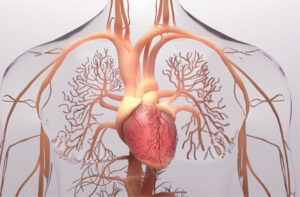By Jerry and Lisa Meloche, Pharm.D., Owners, Compounding Pharmacists
 Aging is a natural process everyone experiences, but the effects of aging are not solely determined by the passage of time. Chronic, low-grade inflammation, often referred to as “inflammaging,” has emerged as a key driver of age-related diseases, including cardiovascular disease.
Aging is a natural process everyone experiences, but the effects of aging are not solely determined by the passage of time. Chronic, low-grade inflammation, often referred to as “inflammaging,” has emerged as a key driver of age-related diseases, including cardiovascular disease.
September is the second month in our series on Inflammaging. We encourage you to check back in future editions to learn more. You can also read previous editions online at www.creativescripts.net.
Understanding Inflammaging: A Key to Addressing Aging and Cardiovascular Health
Inflammaging is a term used to describe the chronic, low-level inflammation that typically increases with age. Unlike acute inflammation that occurs in response to injury or infection, inflammaging is a persistent state of inflammation that can lead to tissue damage and the development of various age-related diseases. Cellular senescence, immune system changes, and the accumulation of pro-inflammatory molecules in the body drive this phenomenon.
As individuals age, the immune system undergoes a gradual decline in function, known as immunosenescence. This decline is accompanied by an increase in the production of pro-inflammatory cytokines, which contribute to the state of chronic inflammation. This understanding of the immune system’s pivotal role in inflammaging is crucial for addressing this health issue. Additionally, cellular senescence, the process by which cells lose their ability to divide and function properly, further exacerbates inflammaging by releasing inflammatory molecules into the surrounding tissue.
Hormonal Changes, Inflammaging, and Cardiovascular Risk in Postmenopausal Women
Women experience a unique set of challenges related to inflammaging due to the hormonal changes that occur during menopause. The decline in estrogen levels accompanying menopause is associated with an increase in pro-inflammatory cytokines and a corresponding rise in systemic inflammation. This hormonal shift not only accelerates the process of inflammaging but also increases the risk of cardiovascular disease.
Estrogen plays a protective role in cardiovascular health by modulating the immune response and reducing inflammation. In postmenopausal women, the loss of estrogen’s anti-inflammatory effects contributes to the heightened inflammatory state characteristic of inflammaging. As a result, postmenopausal women are at a greater risk for developing cardiovascular disease, particularly in the presence of other risk factors such as hypertension, obesity, and diabetes.
The Role of BHRT in Addressing Inflammaging
Bioidentical Hormone Replacement Therapy (BHRT) has gained attention as a potential strategy to counteract the effects of inflammaging, particularly in postmenopausal women. BHRT involves the use of hormones that are chemically identical to those produced by the human body, offering a more natural approach to hormone replacement compared to traditional synthetic hormones.
BHRT may also improve other aspects of cardiovascular health, such as lipid profiles and endothelial function. Estrogen has been shown to increase high-density lipoprotein (HDL) cholesterol, the “good” cholesterol, while lowering low-density lipoprotein (LDL) cholesterol, the “bad” cholesterol. Furthermore, BHRT has been associated with improved endothelial function, crucial for maintaining healthy blood vessels and preventing atherosclerosis.
Solutions from Creative Scripts
Bioidentical Hormone Replacement Therapy (BHRT) offers a promising approach to managing inflammaging and its associated health risks. By restoring hormone balance, BHRT can reduce chronic inflammation, lower the risk of cardiovascular disease, improve physical resilience, and potentially prevent neurodegenerative diseases. Evaluating cytokine levels can further enhance the diagnosis and treatment of inflammatory conditions, making BHRT a valuable tool in promoting healthy aging.
For individuals experiencing hormonal imbalances or chronic inflammation symptoms, seeking medical advice from a qualified healthcare provider is essential. Creative Scripts in Naples, FL, offers comprehensive BHRT solutions tailored to meet each patient’s unique needs, helping them achieve optimal health and wellness.
Creative Scripts Compounding Pharmacy custom builds medication, one patient at a time. We use the highest quality pharmaceutical-grade ingredients, state-of-the-art bases, equipment, and technology. Continual training on the newest techniques, advances in therapy, and regulations allows our pharmacists and technicians to provide the safest, most effective medications for you AND your pets. In addition to compounded medications, we offer pharmaceutical-grade nutritional supplements, health advice, and hormone consults. Creative Scripts specializes in veterinary compounding, dermatology, bio-identical hormone replacement therapy (BHRT), pain management, and more. Pharmacists Jerry and Lisa Meloche have served Naples and surrounding communities since 2005.
Come in to see us or call AND MENTION THIS AD for a one-time $15 off a new or transferred prescription!
Creative Scripts Compounding Pharmacy
239-261-0050
600 Goodlette Road North #108
Naples, FL 34102
www.creativescripts.net
References
1. Mendelsohn, M. E., & Karas, R. H. (2005). Molecular and cellular basis of cardiovascular gender differences. Science, 308(5728), 1583-1587.
2. Rossouw, J. E., et al. (2007). Risks and benefits of estrogen plus progestin in healthy postmenopausal women: Principal results from the Women’s Health Initiative randomized controlled trial. JAMA, 288(3), 321-333.
3. Grodstein, F., et al. (2003). Postmenopausal hormone therapy and the risk of cardiovascular disease. The New England Journal of Medicine, 349(6), 523-534.
4. Lobo, R. A. (2017). Hormone-replacement therapy: Current thinking. Nature Reviews Endocrinology, 13(4), 220-231.
5. Stevenson, J. C. (2012). Hormone replacement therapy: Review of the current evidence. Best Practice & Research Clinical Endocrinology & Metabolism, 27(4), 391-402.










